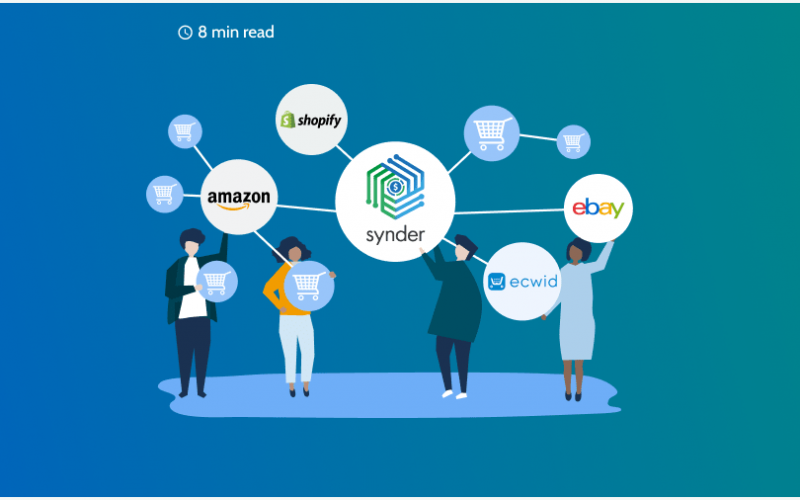Synder, an app providing smart finance and bookkeeping management has announced its recent integration with Shopify, eBay, Amazon, and Ecwid by Lightspeed, which means that now e-commerce businesses can also join the 20K community of small and medium-sized businesses who already set their accounting on autopilot.
How to increase online sales with Synder?
Well, businesses operating within the e-commerce domain are now able to manage their sales for an e-commerce store in an effective way and have their fees recorded automatically in QuickBooks and Xero categories that they can set themselves. Michael Astreiko, CEO of CloudBusiness, which operates Synder, outlined why it was important to make this integration possible, explained how it impacts e-commerce businesses, and what value it will bring to them. Take a few minutes to read a CEO take on the trends to expect in the future of SMBs accounting and bookkeeping development.
At what point did you realize that it was time to integrate into e-commerce platforms and how did you start?
Covid-19 and the loss of offline clients. Many businesses were closing or putting their activity on hold for a while. Serving thousands of SMBs, we faced this problem ourselves when some of our clients decided to leave Synder due to Covid-19. It was a hard time for everyone, but at the same time that was a good call for us to act, and therefore we created a program of helping offline businesses quickly move their activity online, at least partially. We started contacting our clients who suffered from the Covid outcome a lot and offered them our educational program on how to start selling online even though they thought their sphere of activity was not meant for online sales at all.
And here, I want to quickly share a case of one of our customers from California, Jade – an owner of a hair salon – who was going to unsubscribe from Synder, as her business was put on the brink of closure due to the Covid-19 outbreak. Our program encouraged her to try to bring her business online. So she launched online at-home haircare tutorials in Zoom and leveraged Synder to easily receive online payments and process them in the accounting platform. It ensured a constant inflow of cash to support her business.
While working on the program and adjusting it to different needs, we came to the idea that there are a lot of existing businesses in the eCommerce sphere that can utilize many of Synder’s features. Initially, we were focusing on professional services and it might have seemed that everything has already been created for eCommerce, with there being nothing to improve, but the truth is that there are still a lot of aspects to focus on as the eCommerce sphere is not static, it is transforming influenced by the internal evolution of sales and the external circumstances. Jade’s story is a good example of such a transformation.
The pandemic has contributed to the transition of many small businesses into an online model. Does this somehow change their existing bookkeeping and accounting processes?
When you start to accept payments online, you need to understand that cash flow management works quite differently compared to a regular offline way. E.g., Shopify will take its fee from every transaction but will record daily summary in net to your bank account. However, you cannot record only the net amount received. You have to reflect both gross amounts and fees in your accounting, otherwise, your books will be unbalanced and your P&L report will be wrong. This processing fee is a new “substance” for offline businesses, and it usually takes time for them to get used to managing this new part of their accounting. Unfortunately, quite often it is organized in a wrong or non-optimized way from the very beginning. But luckily, there are tools and companies like ours that are helping their clients to learn more about the quick, error-free, and automated ways of doing bookkeeping of their fees or online sales in general, and utilize it.
Synder simplifies the process of transferring data into QuickBooks and Xero. What can you say to those who are convinced that they don’t need any additional software if they already use QuickBooks or Xero?
Both QuickBooks and Xero have powerful marketplaces for third-party apps, and both do not have direct integrations with Amazon, eBay, or Shopify. So clients have to use third-party solutions anyway. However, it does not mean that in such a case the user experience will be worse, sometimes it even can be the other way around. A smaller company has a bit more flexibility to talk to their clients more frequently, listen to their pain points and needs, and as a result, deliver the features that are wanted by many businesses right here and right now. On the other hand, large accounting platforms like QuickBooks or Xero are doing a great job for both parties: for end customers, it’s the features they deliver, and for other software companies, specializing in different domains, it is the API they offer. Thanks to this approach, QuickBooks and Xero built a strong infrastructure where any type of business can find a solution to their specific problem. To my mind, there are always two paths: you can either play alone or invite your friends to join a game. Playing together is always more fun!
Do you think that eventually, companies like Amazon, PayPal, or Square will be able to integrate with QuickBooks and Xero so there will be no need to involve a third-party any longer?
We already saw several such integrations. And unfortunately (or fortunately for us), they usually work with a specific cohort of clients and do not cover many smaller use cases for different types of business. But such use cases still exist and need to be solved. Sometimes it does not lay in their business strategy, or it is too costly to develop and maintain such integrations. But the truth is that it is always related to accounting rather than payment processing or eCommerce activity. So, this is not their target business, actually. In the architecture of any integration of such a kind, accounting is always the top prerogative.
Speaking about us, having a deep knowledge of the accounting processes, we totally understand that this sphere loves nothing more than accuracy. Machine accuracy in every action is a thing that every accountant and business is always looking for, and this is something that we set as our main target. These words make a part of our company’s motto. The other important part of this motto is the human approach, as we always keep in mind that it’s important to remember that we are humans, and we are here to support and help each other in every step of the way, in every scenario that’s playing out. “Machine accuracy. Human approach” is something that makes our accounting knowledge a unique adventure for our clients.
Taking into account your experience, which trends do you think are going to take center stage in accounting and bookkeeping for small businesses and how will it be developed?
Giant corps in the accounting domain are diving into AI and trying to bring bookkeeping processes to a new level. Therefore we see the bookkeeper’s occupation transforming as a whole into the role of a business advisor. The consumer market is going online, and with such services as Amazon, Walmart Online, or Shopify, it will become a habitual thing for everyone to buy online rather than spending time shopping offline. Consequently, online businesses will be seeking to put their financial management and bookkeeping on complete autopilot with an “AI concierge” doing this job for them so that they can totally focus on serving their clients. The formula, in this case, looks simple: the more automated processes you have, the better your business is performing.
Also, it is now obvious that accounting is no longer a math science where you operate with numbers and diagrams. It is not something you can work on in isolation as it includes customer information, products and inventory management, financial operations and forecasting, and even loan management, and much more. The accounting platforms are now a multifunctional business tool that needs to cover all critical aspects of any business. This approach enables many software companies from different spheres (like CRM systems, Inventory tracking, etc.) to collaborate in one common ecosystem. Such collaboration has a clear pattern: big platforms are providing the clients with the machine and smaller companies are fine-tuning its engine, tailoring the system based on the specific needs of a customer. We see a lot of startups emerging nowadays that try to combine some of the features that previously were considered to be a mismatch. But things change, and business and consumer habits change as well.
If you could personally address the reader, what would you say?
I’d like to quote a famous tweet. It goes like this:
– What drives your success? CEO?
– No.
– CTO?
– No.
– Covid?
– Yes.
The last months haven’t been easy on anyone, but at the same time, such hard times are showing the new horizons and edges of technology, revealing a path for the next 5-10 years and force us all to go out of our comfort zone and develop. I wish everyone who is reading this interview, whether you are an SMB, accountant, or a software company to keep going, to be brave to invent and test brand-new things and approaches, and remember that we are living in times of close collaboration with each other — so use this power because playing this game together is always more fun!






